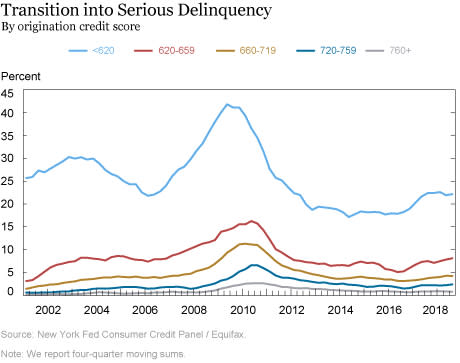People aren't paying their credit cards and more accounts are being shut down, and it could be a sign that 'economic clouds are darkening'
Credit-card delinquencies, application rejections, and involuntary account closures are all on the upswing, according to a report from the Federal Reserve Bank of New York.
The Fed says these developments are "potentially concerning" given the strength of the economy and comparatively low interest rates.
The trends most likely indicate that credit-card companies issued debt too freely in the preceding years.
But they could also signal that lenders are bracing for an economic downturn and paring back risk accordingly.
The economy is robust, unemployment is sitting at 3.7% - its lowest mark in nearly half a century - and interest rates, though moving upward, are still relatively low.
So why are credit-card delinquencies, application rejections, and involuntary account closures all on the upswing?
That's what the Federal Reserve Bank of New York would like to know.
The Fed released the results this week of its Credit Access Survey - a quarterly report on US borrowers - and it surfaced a couple of alarming trends that suggest credit-card issuers are getting skittish and paring back risk: Both credit-card rejection rates and involuntary account closures are on the rise.
Rejection rates for credit-card applicants came in at 20.8% in the October survey, up from 14.4% a year ago, while the rejection rate for credit-limit increases ticked up to 31.7%, compared with 24.9% a year ago.
Meanwhile, the proportion of respondents who had an account shut down by a lender reached its highest level since the Fed launched the Credit Access Survey in 2013. In October, 7.2% of surveyed consumers reported having an account involuntarily shut down in the previous 12 months, up from 5.7% last year and 4.2% in 2016.
Most of these account shutdowns are credit card or retail store cards.
A separate New York Fed report released last month - the Quarterly Report on Household Debt and Credit - produced a similar finding. The report, which mines Equifax consumer credit reports for data, showed an uptick in the past year and a half in account closures, again primarily from credit cards.
Why are credit-card issuers rejecting more customers and shuttering more accounts?
One reason is that they may be spooked by the increasing number of people who aren't paying off their cards. Credit-card delinquency rates began to climb sharply toward the end of 2016, a trend that hasn't reversed in 2018, according to Fed data.
Given the healthy state of the economy and low unemployment, an increase in delinquencies is "potentially concerning," according to the Fed, and most likely signals that card companies issued debt too freely and to less-trustworthy borrowers in preceding years and are now trying to reverse course.
That's consistent with the fact that credit-card issuance inflated substantially starting in 2013 - credit-card balances were up from $US670 billion in the third quarter of 2013 to $US844 billion in the same quarter this year - and that the sharpest increase in delinquencies is among borrowers with lower credit scores, according to Fed data. The increase in delinquencies among higher credit-score brackets, however, suggests loose lending wasn't limited to subprime borrowers, the Fed points out.
The uptick in delinquencies, rejections, and account closures could also be symptoms of a much darker malady: early cracks in a weakening economy.
When people lose their jobs or are struggling financially, credit cards tend to be one of the first bills they stop paying, as compared with secured loans for a home or a car in which people risk losing those crucial assets.
If the economy is turning, card issuers have a giant incentive to get ahead of the trend, especially amid the environment of climbing interest rates, which potentially makes life even more difficult for cash-strapped cardholders.
"Credit-card lenders are tightening up the credit approval process as the economic clouds are darkening for our economy. They see a downturn coming, so, in anticipation of that trend, are reducing their risk exposure in the unsecured card space," Robert Hammer, the CEO of the payments consulting firm R.K. Hammer, told Business Insider when asked about the latest Fed report.
Lenders are already facing a tough outlook heading into 2019 with a saturated US market and declining return on assets, according to Brian Riley, the director of Mercator Advisory Group's credit-card consulting business.
He predicts growth will slow next year for card issuers as they brace for higher delinquencies among the country's 470 million cardholders.
It's too early to say whether the economy will dip into recession or whether delinquencies, rejections, and involuntary account closures will continue to streak higher, but the Fed will be keeping a close eye on these trends, saying in its report that it plans to "continue investigating these issues."
Read more

 Yahoo Finance
Yahoo Finance 



